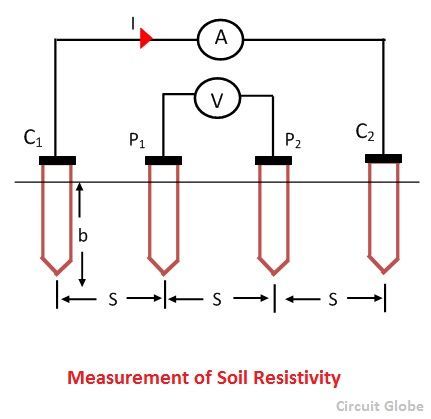Definition: The measure of the resistance offered by the soil in the flow of electricity, is called the soil resistivity. The resistivity of the soil depends on the various factors likes soil composition, moisture, temperature, etc. Generally, the soil is not homogenous, and their resistivity varies with the depth. The soil having a low resistivity is good for designing the grounding system. The resistivity of the soil is measured in ohmmeter or ohm-centimeters.
The resistivity of the soil mainly depends on its temperature. When the temperature of the soil is more than 0º, then its effect on soil resistivity is negligible. At 0º the water starts freezing and resistivity increases. The magnitude of the current also affects the resistivity of the soil. If the magnitude of current dissipated in the soil is high, it may cause significant drying of soil and increase its resistivity.
The resistivity of the soil varies with the depth. The lower layers of the soil have greater moisture content and lower resistivity. If the lower layer contains hard and rocky layers, then their resistivity may increase with the depth.
Measurement of Soil Resistivity
The resistivity of the soil is usually measured by the four spike methods. In this method the four spikes arranged in the straight line are driven into the soil at equal distance. A known current is passed between electrode C1 and C2 and potential drop V is measured across P1 and P2. The current I developed an electric field which is proportional to current density and soil resistivity. The voltage V is proportional to this field.
The soil resistivity is proportional to the ratio of the voltage V and current I and is given as
Where ρ is the resistivity of the soil and their unit is ohmmeters. S is the horizontal space between the spikes in m and b is the depth of burial in metre.
If the measurement is to be carried out using the main supply, an isolating transformer should be connected between the main supply and the test setup. So that the result may not be affected by it.



Nice